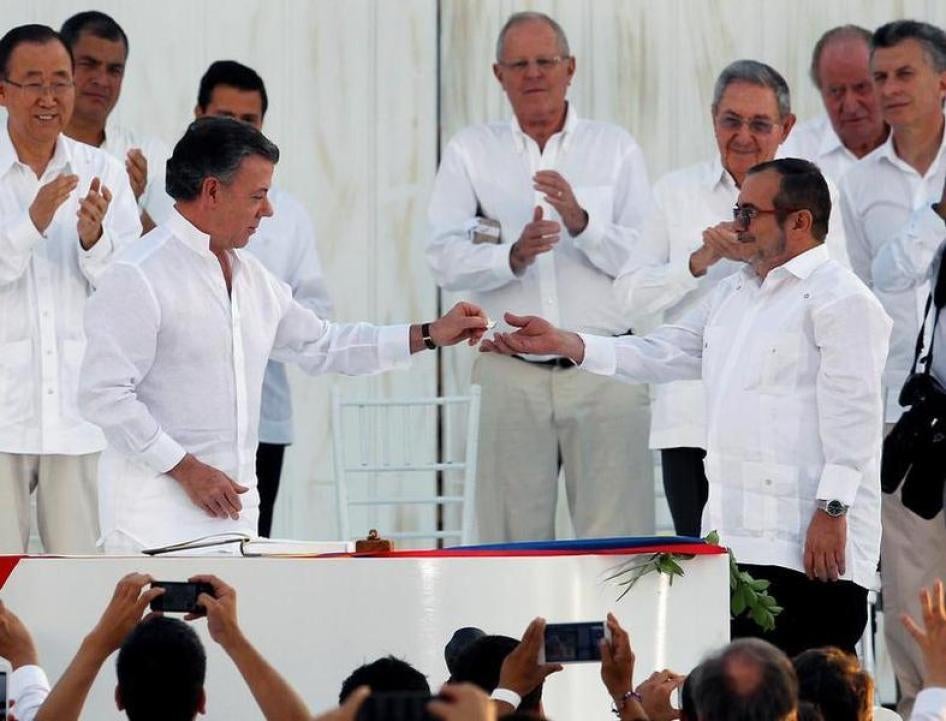Many leaders from the region and elsewhere gathered in Cartagena, Colombia on Monday this week to celebrate the signing of a peace accord by President Santos and “Timochenko,” the leader of the Revolutionary Armed Forces of Colombia (FARC) guerrillas.
There is certainly reason to celebrate: after four years of peace talks in Cuba, the negotiating parties have reached a deal that poses a landmark opportunity to curb abuses in a country where hundreds of thousands of civilians have been killed during the armed conflict. Unfortunately, however, the justice component of the agreement, as currently composed, will compound impunity in the country and therefore puts the prospect of sustainable peace at risk.
Thousands of victims have suffered systematic atrocities at the hands of FARC. The guerrillas have killed and abducted civilians, carried out disappearances, engaged in widespread sexual violence, used child soldiers, and subjected combatants to cruel and inhumane treatment.
Under the peace accord, guerrilla fighters responsible for these and other abuses —including war crimes and crimes against humanity—can avoid spending a single day in prison. Instead, those who fully and promptly confess their crimes will have modest and short restrictions on certain rights —like their right to movement— and will have to work in community service projects.
President Santos defends the deal, contending that “perfect justice would not allow peace.” He is right —no one can expect that guerrilla fighters would volunteer to surrender their weapons and spend the rest of their lives in prison. Instead of a “perfect” deal, the Santos administration promotes the agreement as one that “achieves as much justice as possible while transitioning from conflict to peace.” That is hard to accept.
Further, the justice benefits afforded to guerrillas will also benefit members of the armed forces responsible for atrocities. This a surrender of justice that no one could reasonably see as necessary to achieve peace with the guerrillas.
The agreement will probably benefit many soldiers responsible for thousands of “false positives” cases in which civilians—many of them young men lured to remote locations by bogus job offers—were shot dead and then reported as combat deaths to satisfy senior officers’ eagerness for high body counts.
We at Human Rights Watch have shown that numerous active or retired army generals could bear criminal responsibility for those crimes, including the current head of the Colombian armed forces. Between 2007 and 2009, he commanded a brigade allegedly responsible for the killing of dozens of civilians. But the agreement could help him and other commanders avoid accountability thanks to a misleading definition in the agreement of “command responsibility” —a key principle under international humanitarian law—that could be interpreted to depart from international law, setting the bar higher for judicial authorities.
The agreement could also benefit commanders of right-wing paramilitary groups responsible for mass atrocities. Some of them demobilized a decade ago, accepting a deal to serve up to eight years in prison under a law that promised them that they would receive any benefit afforded to other illegal armed groups, like FARC.
Our experience in Colombia teaches us that the cycle of violence and abuse on all sides is perpetuated by the certainty of those responsible that they will never be punished for their crimes. With the shortcomings of the agreement, the risk is entirely too apparent that grave human rights violations could happen again in Colombia.
Leaders of the international community are right to celebrate that the 52-year conflict with FARC is officially over. Moreover, they should press President Santos to use the implementing legislation to limit the justice deficiencies of the accord. Only then would they be helping Colombia achieve a sustainable peace.









